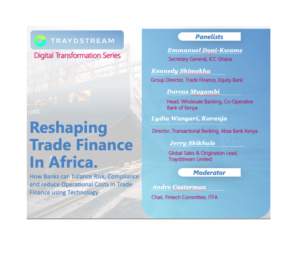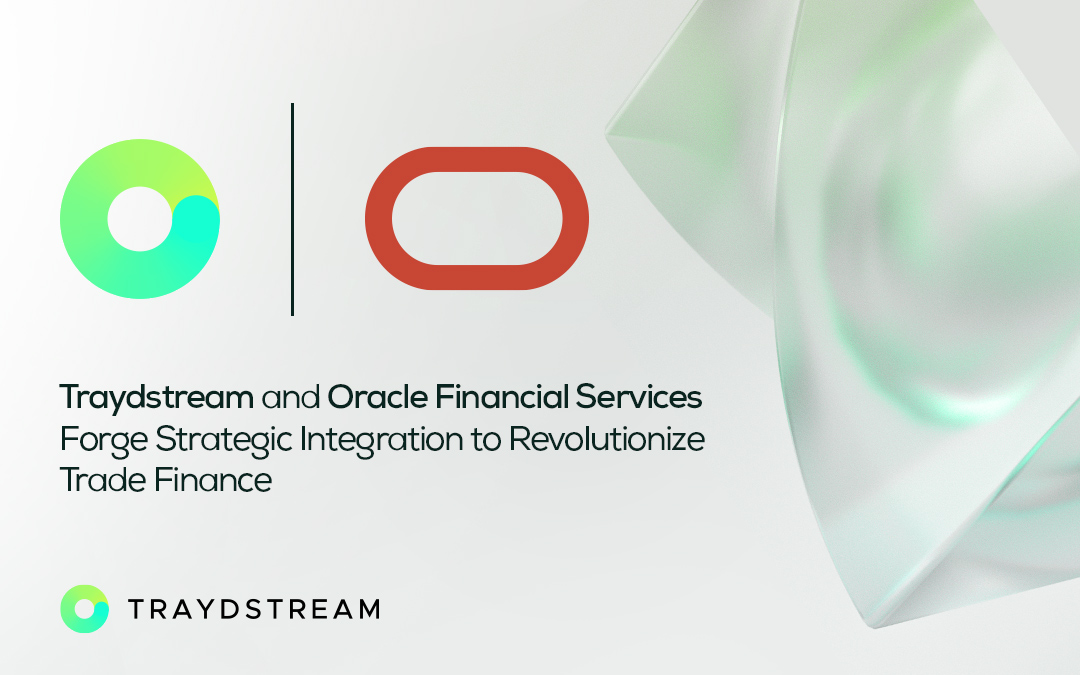
Traydstream invited representatives of Co-Operative Bank of Kenya and ABSA Bank Kenya to discuss on-going technology developments in trade finance in Africa.
Dayo Fagade, a member of the Traydstream team introduced the session and the panelists as follows:
- Dorcas Mugambi, Head of Wholesale Banking, Co-Operative Bank of Kenya
- Lydia Wangari Karanja, Director, Transaction Banking, ABSA Bank Kenya
- Jerry Shikhule, Global Origination Lead, Traydstream
- Moderator: André Casterman, Chair Fintech Committee, ITFA
The debate delivered the following key messages:
- Digitisation has become a key mechanism for SMEs to access trade finance. It therefore helps address the trade finance gap that remains huge at both global and African levels
- The pandemic has accelerated the adoption of digital trade finance solutions by SMEs and corporates; digitisation is therefore becoming a pre-requisite for banks to operate in trade finance
- Digitisation is at the core of most trade finance banks and their operations. It therefore covers the full transaction cycle from transaction initiation in the front office to processing in the back office
- Digitisation enables banks to access more information about parties involved in transactions across various financial services including trade finance, and therefore facilitates informed decision making. Technology usually adds accuracy when digitising and automating repetitive operational tasks such as data analytics and document verification
- In addition to enabling paperless trade, digitisation increases operational efficiency and facilitates the roll-out of additional services such as faster document handling, real-time transaction visibility, end-to-end analytics, …
- A number of hurdles still exist in particular when financing MSMEs such as accessing the appropriate information (e.g., historical data sometimes doesn’t exist) during onboarding and credit risk assessment. Many SMEs are not equipped in this area. Also, the absence of collateral to support financing is hurting them
- The back-office operations of trade finance ought to be automated as much as possible. Technology can help achieve this without changing business practices, processes and systems in place.
Jerry Shikule went on to expand on Traydstream and how technology supports the automation of front- to back-office processing of trade transactions and documents. Adopting Traydstream can be achieved by individual institutions, or by associated ones (e.g., a client and its bank). It is a win-win proposition for banks and their clients.
Panelists shared additional insights:
- Regulators are keen on facilitating digital trade finance innovations and some are working on adapting national laws to enable paperless trade
- Collaborating with regulators is essential in order to integrate digital options in national laws such as use of cloud computing, use of electronic negotiable instruments, use of electronic signatures, …
- Data is becoming key to support automated decision making; technology is a major catalyst to drive innovations in trade finance; once transaction data is available, various additional services can be delivered
We look forward to coming back to our African audience with a number of early adopters of digital solutions.






